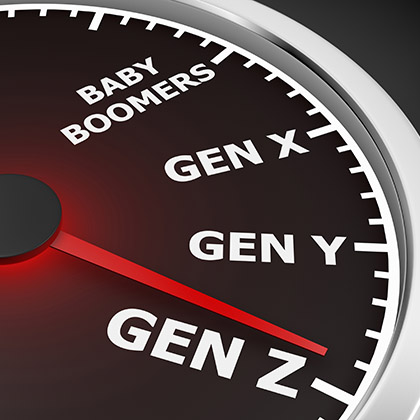
Just when we think we have Millennials figured out, along comes Generation Z.
Four years ago, we interviewed members of Generation Z as teenagers. These are members of society born between 1995 and 2012, and they talked to us mostly about how they engaged with technology and brands.
More recently, as these young people increasingly are entering the workforce, we are seeing heartening insights into what makes members of Gen Z tick as employees.
This is a generation that grew up facing one crisis after another. They were young when the 2008-09 recession knocked their parents out of work. They came of age in an era of school shootings and other domestic terrorism — something their parents seldom experienced when they were young. They’ve only known political polarization, have watched protests spill into the streets, and have soldiered on through the current pandemic and lockdowns.
Jonah Stillman, who graduated from high school in 2017 and now works with his father David on generational issues, noted recently in a presentation to C-suite leaders that Millennials watched movies like “Harry Potter” — a chance to live in an alternate world — while Gen Z watched movies like the “Hunger Games,” set in a fight-to-the-death world that reflected the generational feeling of always being in survival mode.
Gen Z is not a “slacker” generation according to the Stillmans and others. Like all generations who are shaped by societal forces and their parents’ reaction to them, members of Gen Z typically have the following traits in common:
- They are hardworking and resilient. The parents of Millennials taught that if you worked hard and did your best, you’d be a champion. Gen Z parents told their children that if they didn’t do all those things, they would lose. This makes them driven, conservative with money and entrepreneurial, with many of them working — or even setting up their own small businesses — in their teenage years.
- They are self-motivated and resourceful. Gen Zers want to win, on their own merits, and to take responsibility for acquiring knowledge beyond formal education. For example, rather than taking art lessons with a teacher, they may look for instruction online. Rather than sitting through three days of scheduled training, they prefer getting information when they need it, on their own.
- They are more interested in standing out than fitting in. While Millennials were all about collaboration, Gen Zers would rather make their own way in the workplace. They want to learn, but they also want their ideas heard. And, they want to be acknowledged for their individual contributions.
- They value diversity. As the most diverse generation ever, members of Gen Z expect and value diversity, equity and inclusion in the workplace.
- They are natural allies with Boomers. Boomers admire Gen Z’s work ethic, innate knowledge in areas such as technology, and their drive to get things done. Boomers also relate to Gen Z’s need for stability and sense of loyalty. Members of Gen Z are not inclined to job-hop if they believe they can get ahead where they are. Gen Zers like learning from Boomers’ experience, appreciate having colleagues who think similarly to them, and value learning from older employees about how the business world works.
Organizational leaders often view the young as risky hires. But where there is risk, there is also reward. While Gen Z has a different way of viewing the workplace, its members possess many of the traits that will help them thrive. They are loyal, entrepreneurial, self-starters who want to make a contribution. They will need strong mentors and role models: Who doesn’t? And, they will need to learn that collaboration is what makes any organization successful, even if they need time working on their own.
But Generation Z is no longer coming — they’re here. And, our organizations will be better for them.
